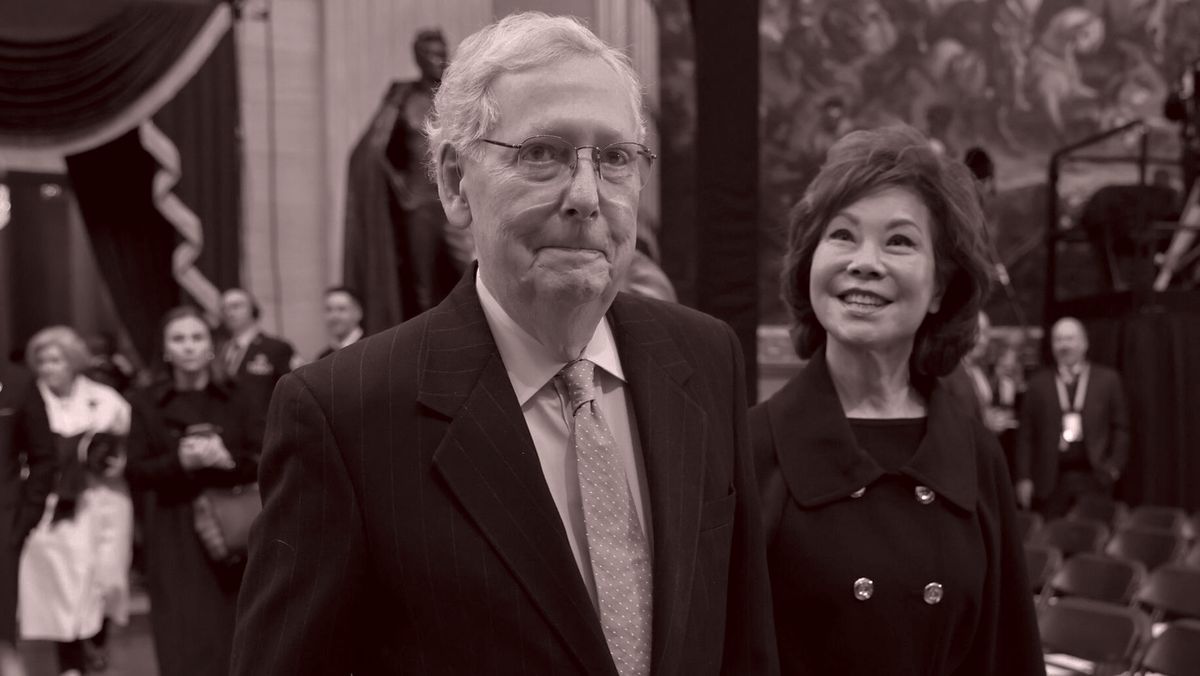Welcome back to The Best & The Brightest. It’s Leigh Ann
Caldwell with ya here on this Super Bowl Sunday. I have no dog in this fight, but I hope your team wins. (I live in Washington. I know how to be a politician, too.)
Speaking of Super Bowl LIX in New Orleans: House Speaker Mike Johnson—a native Louisianan who, if I had to guess, has not spent much time on Bourbon Street after dark—is watching the game with Donald Trump. And, if I also had to guess, Johnson will want to talk to
the president a lot more about passing his agenda than about passing yardage or even Taylor Swift’s outfit. Speaking of which…
|
- The ones and twos: Yes, we’re still talking about one bill versus two bills on Capitol Hill. House Republicans have started furiously working on “one big beautiful bill” that would extend and expand Trump’s 2017 tax cuts, slash the budget, and increase funding for defense and border security. Sure, the math is difficult, which is why this is so hard! Johnson said on Fox News Sunday that the Budget Committee might not be ready to take up the bill
again this week “because the details matter,” but they are getting “very, very close” to a unanimous agreement.
Senate Republicans are sick of waiting, though, as taxes are complicated and it might take forever to prepare a major tax bill alongside spending cuts. So they plan to move their border security and defense supplemental funding
bill through the Budget Committee this week. Senator Lindsey Graham, the chair of the committee, insists that the $340 billion bill will be paid for, but hasn’t specified how.
|
|
|
Open source AI is available to all, not just the few.
There are about 3 billion medical imaging exams done per year with a 4% error rate—that’s millions of patients.
The solution: “With Meta’s free open source AI model, Llama, we built an AI tool to help catch radiology errors,” says Dr. Clark.
Learn more about how others are building with open source AI.
|
|
|
- Democrats’ dilemma: The Democrats are a bit of a mess, as you may have heard, with navel-gazing and second-guessing impeding their already limited ability to respond to Trump or to win back his white male voter base. (Senator John Fetterman has one idea, which he detailed this week with my partner Tara
Palmeri.)
At this point, the battle lines are pretty well articulated. Some centrist and even progressive Democrats blame activist groups for having pushed the party too far left ahead of the last election. Others, like David Axelrod, have argued that the party can’t pull the fire alarm every time, say,
Elon Musk gains access to private government agency information. Meanwhile, some are worried that Trump is obliterating the federal government before our very eyes, and that Democrats need to get engaged ASAP. Indeed, there isn’t much consensus, and the fact pattern is tricky: Trump has been in office for less than a month; the next national election isn’t for another year and nine months. The Democrats’ message and focus will become clear, many are reassuring the
party. And remember, Republicans voted to impeach Trump in February of 2020…
Meanwhile, Senate Democrats are at least preparing to respond to everything Trump does, and are dividing themselves up into working groups to devise messaging and legislative responses. It’s the beginning of a strategy, one senior Democratic aide said. At the same time, party leaders are evaluating their leverage over the next government funding bill. In modern times, at least,
Republicans have never been able to fund the government without the Democrats’ help, and with Elon’s potentially illegal sledgehammer to the federal bureaucracy, Democrats are considering denying Republicans their support, which could lead to a shutdown as early as March 14. “They are the majority. And if they cannot govern then, you know, that’s for the American people to see,” freshman senator Andy Kim said on Meet the Press.
Democrats are likely to
get more fodder very soon. Trump told Fox News’s Bret Baier in a pre-Super Bowl interview that he’s going to tell Elon to dig into the Department of Education and the Pentagon next.
|
|
|
Newly unencumbered by leadership responsibilities and party
loyalties, Mitch McConnell is free to spoil nominations, torment his former tormentor, and defend against a new wave of isolationism. Could the most mischievous member of the Senate be the 82-year-old former leader who’s battling infirmity and, possibly, his own party?
|
|
|
Mitch McConnell, the longtime Republican leader
in the Senate, used to describe his erstwhile role as being that of chief spear catcher—the guy who protected his conference and its agenda from public attacks, primary threats, and Oval Office pressure. Indeed, McConnell’s preternatural ability to catch and disarm incoming ordnance earned him unprecedented support in the chamber—a mixture of admiration and pure fear that allowed the devout institutionalist to reign pretty much unchallenged during an era of populist upheaval. And yet
these days, as McConnell has passed his dowry to John Thune and seems unlikely to seek reelection, the 82-year-old has morphed into an ornery rank-and-file senator with the ability to upend MAGA’s legislative agenda and torment his former tormenter, Donald Trump. In many ways, it’s a fitting final act.
This week, the Senate is expected to vote on two of Trump’s most controversial
nominees: Tulsi Gabbard as D.N.I., and Robert F. Kennedy Jr. to lead H.H.S. Both will likely be confirmed, now that two would-be defectors are falling in line: Senator Bill Cassidy, a physician, has said he’ll vote for Kennedy; meanwhile, Todd Young and Susan Collins will vote for Gabbard. But no one can say with any certainty what McConnell will do—and not just on how he’ll vote on Trump’s most odd-ball
nominees. This enigma amplifies growing questions about how McConnell plans to spend his hard-earned, out-of-fucks-to-give twilight era. Once a relentless partisan, will he devote his platform to ensuring that the United States doesn’t decimate Western alliances and retreat from the world, thereby pitting himself against his president and a growing number of colleagues in his conference? And could it work?
|
|
|
Open source AI is available to all, not just the few.
In this job market, how are you standing out in a sea of resumes?
The solution: “With Llama, Meta’s free open source AI model, we built an AI tool that helps candidates write resumes and more—like a personal career coach,” says CEO Mitchell.
Learn more about how others are building with open source AI.
|
|
|
Democratic Senator Tim Kaine told me he wasn’t
surprised that McConnell voted against Pete Hegseth as SecDef, because “the guy had been rude and disrespectful to and about Mitch McConnell.” Yes, Hegseth had said during various media appearances that McConnell was protecting Biden, but I’m reliably told that McConnell’s opposition
wasn’t personal—instead, it coalesced around his profound interest in U.S. national security and his belief that the former Fox News host was flagrantly unqualified to lead the most complicated government agency during tumultuous times. McConnell refused to meet with Hegseth during the months leading up to his confirmation vote, and he rebuffed a call from J.D. Vance when it momentarily seemed like Hegseth’s confirmation was in jeopardy. (In the end, the waffling Thom
Tillis overcame his reservations.) “What would a meeting or a hearing or anything else change about your résumé?” one McConnell insider told me, explaining the senator’s decision to resist.
As I reported last week, McConnell also hasn’t met with Gabbard or Kennedy, as is customary for senators. People close to McConnell aren’t sure how he’ll vote on either nominee, both of whom are likely to be confirmed
regardless. In many ways, his beefs are personal. As a former member of the Gang of Eight—the group of congressional leaders who receive the most high-level intelligence briefings—McConnell still cares deeply about the national security apparatus, and he’s skeptical of Gabbard’s judgement to lead O.D.N.I. When R.F.K. Jr. said the polio vaccine killed more people than it saved, McConnell, a polio survivor, called his perspective “dangerous.” Susan Collins, one of McConnell’s closer friends in the
Senate, specifically asked Kennedy about the polio vaccine at his confirmation hearing, with McConnell in mind.
|
McConnell still suffers from the impact of polio, a disease that has affected his
gait and balance, which is getting worse as he ages. (Despite the profound impact of the Salk vaccine, treatments for the long-term ramifications of the disease have actually been comparatively under-resourced.) Just this week, McConnell fell while walking down the steps off the Senate floor. Moments later, during the Republican lunch, he fell again, his plate of a hamburger, hot dog, french fries, and ketchup flying in the air and landing on his head on its way down. Senator John
Barrasso, a doctor, rushed over, but McConnell refused any medical attention. He just got up, I’m told from a person who was told about the incident, walked to his table, sat down, and acted as if nothing had happened.
Notably, even though McConnell hasn’t been talking with his colleagues about how he’ll vote on Trump’s nominees, he did inform Thune and Barrasso, to avoid surprises. He knows more than anyone that there’s little worse a senator can do to a leader than to not tell
them how they’ll vote. Similarly, no one in the Senate knows better than McConnell about the pressure each senator is under—weighing their own primary threats, public attacks from MAGA world, and phone calls from Trump on each vote, to name just a few.
Nevertheless, McConnell is hoping to command significant sway among Senate Republicans on foreign policy and defense spending. As the top defense appropriator, he has told people that when he’s done with the defense budget, he’ll
make the late John McCain look like a dove by comparison.
|
Now that he’s unshackled by the burdens of leadership and doesn’t have to pass bills
or keep the party from clawing each other’s eyes out, McConnell can spend his time and any influence he has thwarting the growing isolationists in his party. Notably, he’s using the media to shape the narrative: giving 60 Minutes an in-depth interview that aired last Sunday, publishing a 4,500 word essay in Foreign Affairs in
December, and delivering a speech at the Reagan National Defense Forum, where he outlined his vision for maintaining a strong national defense.
|
|
|
Never a man of many words—he was once described as a
pinto bean—McConnell attends nearly every Republican lunch meeting to remind his colleagues of the importance of defense spending. He speaks more often now than when he was leader, I’m told, and raises his hand to be called on, like the rest of the senators. A disciple of interventionism, he provides a historical perspective on the percentage of G.D.P. that the
U.S. spends on defense, currently at a post-World War II low.
There’s little personal loyalty to McConnell, an insular leader who siphoned power by taking it away from individual senators. But everyone agrees that he still has some influence in the conference, especially
among the older generation of institutionalists. Whether he can hold sway on the defense issue will be one of the biggest tests of his controversial career. Instead of being the master partisan he was, he’s battling a popular president of his own party during a time when his ideas and belief system—stemming from his father’s service in World War II—can seem old fashioned and outdated, and more amenable to Democrats.
McConnell and Trump haven’t spoken since December of 2020—in fact, he hasn’t uttered Trump’s name since the January 6 attack on the Capitol. (At the time, his wife, Elaine Chao, abruptly resigned from her position as Trump’s transportation secretary.) But, as we know, the party has been subsequently remade in Trump’s image, and McConnell played a significant role in that: He may have blamed Trump for the insurrection, but he stopped short of
voting (or persuading others to vote) to convict Trump in his second impeachment trial. Recall that a conviction would have prevented Trump from running again. Instead, he gave a passionate speech that the legal system would take care of it. Of course, the conservative Supreme Court that McConnell essentially built, in large part by blocking Merrick Garland’s confirmation, ruled that a president is immune from prosecution for any official acts.
That
may be a crucial data point here. In The Price of Power, Michael Tackett’s biography of McConnell, the author quotes former senator Lamar Alexander as telling his subject, “You’ll always be remembered for the last thing you do.” Now McConnell is betting his legacy on preventing Trump and his Republican followers from shrinking America’s role in the world. As budget battles are gearing up and a faction of hardline Republicans are vowing to cut the
defense budget, his first test will arrive very soon.
|
|
|
Join Emmy Award-winning journalist Peter Hamby, along with the team of expert journalists at Puck, as they let you
in on the real conversations insiders are having across the four corners of power in America: Wall Street, Washington, Silicon Valley and Hollywood. Puck’s contributors will bring you smart conversation around the inside stories happening in these worlds. Presented in partnership with Audacy, new episodes publish daily, Monday-Friday.
|
|
|
Unique and privileged insight into the private conversation going on inside Wall Street, as told by the
best-selling journalist and former M&A banker.
|
|
|
Need help? Review our FAQ page or contact us for assistance. For brand partnerships, email ads@puck.news.
You received this email because you signed up to receive emails from Puck, or as part of your Puck account associated with . To stop receiving this newsletter and/or manage all your email preferences, click
here.
|
Puck is published by Heat Media LLC. 107 Greenwich St, New York, NY 10006
|
|
|
|







_01JJSBAXXHQN80CXY7P8M4EZXZ.jpg)
_01JJSBPXFB4HDG3GDAV1DKBQM2.jpg)


















